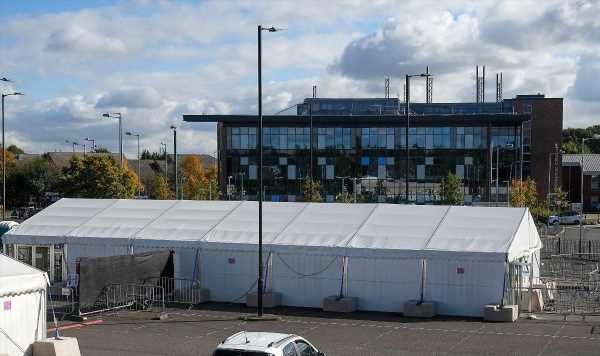Nick Ferrari grills Robert Jenrick on Test and Trace failures
We use your sign-up to provide content in ways you’ve consented to and to improve our understanding of you. This may include adverts from us and 3rd parties based on our understanding. You can unsubscribe at any time. More info
Hundreds of hospitalisations and 20 deaths that were caused by fatal testing errors came after health officials poured cold water on warnings about dangerous inconsistencies at a Covid lab that came months in advance. A major error occurred at the Immensa Laboratory in Wolverhampton after tens of thousands of people were told that they did not have coronavirus when they did in fact have the virus. According to a Government report published in November, the fatal mistake resulted in an estimated 40,000 extra infections, 700 hospitalisations and 20 deaths.
While the UK Health and Security Agency (UKHSA) was made aware of the errors and suspended testing at the laboratory on October 2021 following reports of inaccurate results, it has now been revealed that officials from Public Health Wales (PHW) raised the alarm over the issues with their colleagues in England months before the damage was done, according to a report by The Times.
Despite writing to them serval times, they were repeatedly told that nothing was going wrong, the report claims.
A follow-up email which came after an initial email was disregarded, read: “Given the very significant and wide-reaching potential impacts of false positive or false negative results, I would be grateful for your further attention to the concerns.”
It came just eight months before the emergence of the news about the disastrous consequences of the lab errors surfaced in the Autumn of 2021 following an investigation by the UKHSA.


The Wolverhampton laboratory, run by Immensa, which signed a £119 million testing contract during the pandemic, was commissioned to provide additional testing capacity for NHS Test and Trace from September 2 2021.
Despite the warnings from PHW, the UKHSA investigation found that “no singular action or process implemented by NHS Test and Trace could have prevented the errors within the Immensa laboratory arising”.
This all comes following a Freedom of Information request, revealing more detail about the errors.
Professor Alan McNally, a University of Birmingham microbiologist, who has seen the documents revealing the repeated warning from PHW, was “stunned” by the response to the warnings.
He was even quoted in The Times saying that the data discrepancies pinpointed by PHW in its emails were so significant that, if he had had the same issues raised about his own laboratory in Milton Keynes, he would have slammed the break on operations immediately.

Alarm bells were said to have started ringing for PHW after samples from care home testing that were sent to that laboratory came back a much higher positivity rate.
The samples were 2.66 per cent were positive, compared with 0.45 per cent elsewhere. Upon further inspection, PHW officials discovered that many of the positives were extremely weak signals, only narrowly above the threshold where they would be classed as positive, implying possible contamination.
There also appeared to be a “control” issue, referring to a known positive sample included in each plate being tested. Under normal circumstances, the samples should come back the same strength. However in this problematic lab, but it appeared to vary dramatically.
Prof McNally said. “There isn’t a single person involved in PCR testing who would have looked at their concerns and thought, ‘There’s nothing to see here.’
DON’T MISS
Story of the ancient giant whose body was snatched against his wishes [REVEAL]
UK’s largest North Sea gas firm slashes jobs over windfall tax [REPORT]
Germany claims it’s ended Russian reliance on energy in blow to Putin [INSIGHT]

“If this data had come out of my lab I would have shut down the whole thing until we found out what was going on. Something is clearly massively wrong.”
But it is not just experts who have been left baffled. Social media users have also kicked up a storm following the damning exposé.
Dave Berkeley tweeted: “You’d think that the people running the lab, or commissioning the lab, would have some mechanism in place to monitor how well they were doing their job.”
Paul Mainwood, head of Strategy at Innocent Drinks, described the revelations as “jaw-dropping”. But despite the excess deaths and thousands of hospitalisations, NHS Test and Trace told PHW that it had no concerns about the review that was being conducted.
It said: “All labs within the national network are validated through a rigorous Covid-19 test programme quality assurance and validation process.”

Richard Gleave, director and lead investigator for the Immensa investigation at the UKHSA, said measures had been taken to avoid the same mistakes happening again.
The UKHSA has at the time of its investigation that “staff errors” were to blame for the fatal mistakes made at the lab.
The agency said: “The cause [of the mistakes] was the incorrect setting of the threshold levels for reporting positive and negative results of PCR samples for Covid-19.
“Based on background infection rates in different population groups at the time, UKHSA estimated that this error could have led to around 39,000 results being incorrectly reported as negative when they should have been positive.”
Jenny Harries, UKHSA chief executive, said in November, following a report exposing the full extent of the mistakes made by the private lab: ”I fully accept the findings and recommendations made in this report, many of which were implemented as soon as UKHSA discovered the incident. These ongoing improvements will enhance our ability to spot problems sooner where they do arise.”
Source: Read Full Article
